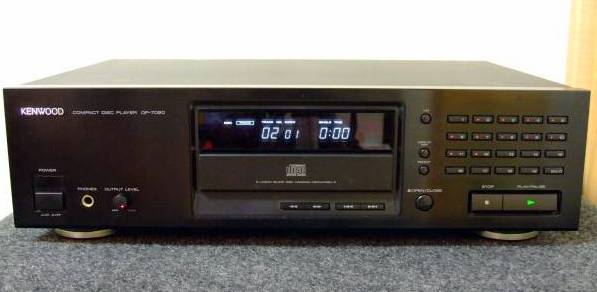Kenwood DP-7020
Data
General
- Manufacturer: Kenwood
- Model: DP-7020
- Type: CD-Player
- Years of manufacture: February 1990 - 1991
- Made in: Japan
- Color: Black
- Remote control: yes, RC-P 8020
- Power consumption: 20 W
- Dimensions: 440 x 128 x 314 mm (WxHxD)
- Weight: 5.9 kg
- Original price approx.: 998 DM ('90)
Connections
- Number of inputs: -
- Number of outputs:
- Analog (Cinch, fixed): 2.0 V
- Analog (Cinch, variable): 0 - 2,0 V
- Digital (optical)
- Headphones (6.3mm jack): 20 mV, 8 Ohm
Technical Data
- Converter: 20 bit, 8-fold oversampling
- Frequency response: 2 - 20,000 Hz (±0.5 dB)
- Dynamic range:
- Signal-to-noise ratio: > 110 dB
- Distortion factor: 0.0025% (1 kHz)
- Channel separation: > 105 dB (1 kHz)
- CD-Text: no
- MP3 support: no
- Pitch control: no
- Auto play: yes
- Shuffle: yes
- Title programming: yes
- Plays CD-R/CD-RW:
Special Features
- Numeric keypad for direct title selection
Remarks
- Other models in the same series:
- Kenwood DP-1020
- Kenwood DP-1520
- Kenwood DP-3020
- Kenwood DP-4020
- Kenwood DP-5020
- Kenwood DP-6020
- Kenwood DP-7020
- Kenwood DP-8020
- Kenwood DP-X 9010
- [[Predecessor model:
- Kenwood DP-7010
- Successor model:
- Kenwood DP-7030
Pictures
- Picture: Kenwood DP-7020
- Picture: from Kenwood catalog Hifi '90/'91.
Reviews
- At that time a multi bit player of the prospective top class the device suffers today from drying out electrolytic capacitors
and outdated opamp equipment behind the DAC which is expressed in a rather treble-friendly, slightly harsh sound slightly harsh sound. In addition, the unit is quite sensitive to vibrations and requires a solid stand. For I/V conversion NJM4580D are used and in the output stage NJM4565D. For decoupling the outputs electrolytic capacitors are used (Elna Cerafine) which are EOL by now. Likewise in the electronics for the voltage supply of the output stage. By replacing the opamps with NJM2068DD,the coupling capacitors with 2,2µF PPs from Panasonic and new filter electrolytic capacitors I was able to achieve a much more balanced sound without any "I like it better than e.g. a Sony CDP-X333ES. The parts effort is low, but the conversion is a bit fiddly.
Links
- Brochure in the Kenwood archive: [1]

